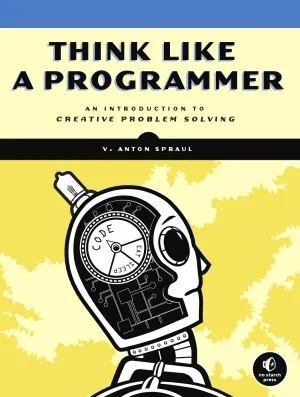Think Like a Programmer An Introduction to Creative Problem Solving
4.6
Reviews from our users

You Can Ask your questions from this book's AI after Login
Each download or ask from book AI costs 2 points. To earn more free points, please visit the Points Guide Page and complete some valuable actions.Introduction
"Think Like a Programmer: An Introduction to Creative Problem Solving" by V. Anton Spraul is more than just a guide to programming techniques; it’s a comprehensive journey into the art of thinking critically and solving problems effectively. This book is tailored for both novice and advanced programmers who aim to go beyond syntax and learn how to approach programming challenges with creativity and confidence. It addresses a crucial skill often overlooked in traditional computer science education—the ability to think like a programmer.
Programming isn’t just about writing code; it’s about solving problems. This book bridges the gap between learning programming languages and applying them in real-world situations. By carefully guiding readers through a series of exercises and case studies, "Think Like a Programmer" emphasizes breaking down complex problems into manageable parts, thinking systematically, and utilizing strategies that foster creativity. Whether you're a student, a self-taught programmer, or a professional, this book will reshape your problem-solving approach and deepen your understanding of programming.
Detailed Summary of the Book
The book is structured around the idea that programming is fundamentally a problem-solving activity. Instead of focusing on a specific programming language, Spraul uses C++ as an instructional medium while ensuring that the concepts can be applied universally across other languages.
The book begins by laying the foundation with key principles of problem solving, such as understanding problems thoroughly, developing robust algorithms, and implementing solutions systematically. Spraul emphasizes the importance of thinking independently and avoiding over-reliance on pre-built libraries or external resources, a mindset that fosters resourcefulness.
Each subsequent chapter delves into different types of problems, such as working with arrays, pointers, recursion, and class design, among others. Through these chapters, concepts like breaking a problem into smaller parts, recognizing patterns, and reusing solutions are explored in depth. Exercises are scattered throughout the book, pushing readers to apply the principles they've learned and test their problem-solving capabilities in practical scenarios.
Instead of giving step-by-step answers, the book challenges readers to embrace "productive struggle," the process of learning through persistence and exploration. By fostering this mindset, Spraul ensures that readers develop skills applicable far beyond the pages of the book.
In the latter chapters, Spraul shifts focus to more challenging topics like advanced data structures, dynamic memory allocation, and working with external resources. The closing sections highlight the importance of thorough debugging, testing, and reflection when reviewing solutions, rounding out a holistic approach to solving programming problems.
Key Takeaways
- Embrace the Struggle: Learning to solve problems is as much about persistence as it is about skill. Struggle fosters creativity and deeper understanding.
- Break Down Problems: Decompose complex challenges into smaller, more manageable components to simplify the solution process.
- Think Logically: Develop a systematic approach to problem solving that avoids shortcuts or rash assumptions.
- Practice Makes Perfect: The exercises and case studies provided in the book highlight that consistent practice is key to mastering problem-solving techniques.
- Learn Universally Applicable Concepts: While the book uses C++ as a medium, the principles discussed transcend language specifics, offering guidance for solving problems in nearly any programming language.
Famous Quotes from the Book
"Programming is not about what you know; it is about what you can figure out." – V. Anton Spraul
"The single most important skill for a programmer is problem solving. It’s not about memorizing syntax or learning every feature of a language. It’s about knowing how to approach your problems." – V. Anton Spraul
"If you’ve figured out what part of the problem you’re stuck on, you’ve made progress. You’ve shrunk the problem." – V. Anton Spraul
Why This Book Matters
"Think Like a Programmer" is an essential read for anyone who wants to not only master programming but also become truly proficient at solving complex problems. While many resources focus solely on teaching syntax or specific languages, Spraul recognizes that technical skills without critical thinking lead to limited growth. The book emphasizes the mindset shift required to evolve from coders into problem-solvers.
This book is particularly significant in today’s era of software development, where technologies and languages change rapidly. Instead of chasing trends, it equips readers with timeless skills: the ability to analyze, adapt, and overcome challenges. These skills are invaluable not only for programmers but also for anyone in technology-driven careers, where problem solving is, and will always be, a core competency.
This isn’t just a book for programming beginners; it’s a resource that professionals can revisit and draw inspiration from. With its emphasis on understanding problems deeply, fostering creativity, and challenging readers to think critically, "Think Like a Programmer" stands out as a beacon for anyone looking to elevate their skills in computer science and beyond.
Free Direct Download
You Can Download this book after Login
Accessing books through legal platforms and public libraries not only supports the rights of authors and publishers but also contributes to the sustainability of reading culture. Before downloading, please take a moment to consider these options.
Find this book on other platforms:
WorldCat helps you find books in libraries worldwide.
See ratings, reviews, and discussions on Goodreads.
Find and buy rare or used books on AbeBooks.
1225
بازدید4.6
امتیاز50
نظر98%
رضایتReviews:
4.6
Based on 0 users review
"کیفیت چاپ عالی بود، خیلی راضیام"


